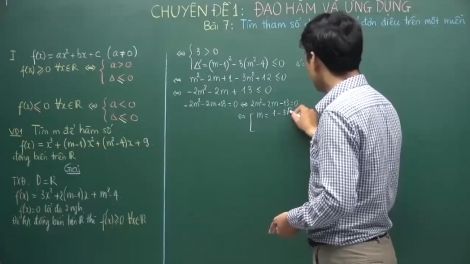Các vấn đề về Động từ nguyên thể hay Danh động từ:
- Verbs + to-infinitives
- Verbs + to-infinitives/that clause
- Verbs + ing/to-infinitives/that clauses
- Verbs + bare infinitives/-ing
 Playlist:
THPT QG Tiếng Anh - Chuyên đề ngữ...
Playlist:
THPT QG Tiếng Anh - Chuyên đề ngữ...
-
Video liên quan
-
Nội dung
-
Bài 1: Tìm khoảng đơn điệu của hàm số

Bài 1: Tìm khoảng đơn điệu của hàm số
Bài giảng sẽ giúp các em nắm được kiến thức cơ bản về cách tìm khoảng đơn điệu của hàm số như: Định nghĩa Điều kiện đủ để hàm số đơn điệu Các bước tìm khoảng đơn điệu của hàm số00:55:29 5168 TS. Phạm Sỹ Nam
-
Bài 2: Tìm tham số để hàm số đơn điệu trên một miền

Bài 2: Tìm tham số để hàm số đơn điệu trên một miền
Bài giảng sẽ giúp các em nắm được kiến thức cơ bản về cách tìm tham số để hàm số đơn điệu trên một miền như: Công thức tính. Điều kiện đủ để hàm số đơn điệu trên một miền.00:28:42 1080 TS. Phạm Sỹ Nam
-
Bài 3: Ứng dụng tính đơn điệu giải phương trình

Bài 3: Ứng dụng tính đơn điệu giải phương trình
Bài giảng sẽ giúp các em nắm kỹ hơn về lý thuyết và một số ví dụ cụ thể về ứng dụng tính đơn điệu giải phương trình.00:32:49 1080 TS. Phạm Sỹ Nam
-
Bài 4: Ứng dụng tính đơn điệu giải bất phương trình

Bài 4: Ứng dụng tính đơn điệu giải bất phương trình
Bài giảng Ứng dụng tính đơn điệu giải bất phương trình sẽ giúp các em nắm được lý thuyết và bài tập để các em củng cố kiến thức.00:32:29 870 TS. Phạm Sỹ Nam
-
Bài 5: Ứng dụng tính đơn điệu giải hệ phương trình

Bài 5: Ứng dụng tính đơn điệu giải hệ phương trình
Bài giảng Ứng dụng tính đơn điệu giải hệ phương trình sẽ giúp các em nắm kỹ hơn cách giải hệ phương trình, cách tìm tính nghịch biến, đồng biến về tính đơn điệu của hệ phương trình.00:29:14 946 TS. Phạm Sỹ Nam
-
Bài 6: Ứng dụng tính đơn điệu chứng minh bất đẳng thức

Bài 6: Ứng dụng tính đơn điệu chứng minh bất đẳng thức
Bài giảng ứng dụng tính đơn điệu chứng minh bất đẳng thức gồm có 2 phần nội dung chính: Lý thuyết Các ví dụ cụ thể nhằm giúp các em chứng minh được đồng biến và nghịch biến.00:43:58 1076 TS. Phạm Sỹ Nam
Contents
- Verbs followed by to infinitives
- Verbs followed by to infinitives or that clause
- Verbs followed by -ing/ infinitive or that clauses
- Verbs followed by bare infinitives or -ing
Verbs followed by to infinitives
afford, ask, choose, happen, help, manage, offer, refuse, wait, want
- I can't afford to go to the cinema twice in one week.
- In the end, Laura chose to study Economics.
- Do you happen to know the time?
- Could someone help me (to) carry like this?
- Jim can't manage to come this evening.
- I offered to give her a lift, but she took a taxi.
- The manager refused to see me.
- There are some people waiting to see you.
- What do you want to do this evening?
Verbs followed by to infinitives/ that clause
- We decided to go home.
- We decided (that) we would go home.
- Mike expects to win.
- Mike expects (that) he will win.
- I hope to see you later.
- I hope (that) I'll see you later.
- Helen pretended to be ill.
- Helen pretended (that) she was ill.
- Sarah agrees to meet you after school.
- Sarah agrees that she will meet you after school.
- At school Graham learned to speak French.
- At school we learned that the Earth goes around the sun.
- You seems to know the answer!
- It seems that you know the answer.
- I wish to leave early today.
- I wish that I could leave early.
- I wish that my teacher would let me leave early.
Verbs followed by -ing
dislike, enjoy, fancy, can't help, keep, mind, practice, can't stand
- I dislike going out in the rain.
- Everyone enjoys going to parties.
- I enjoyed learning this lesson.
- Do you fancy going to the cinema?
- I can't help feeling hungry.
- Do you mind waiting?
Verbs followed by infinitives/ -ing
- The President began to speak/ speaking.
- Some people at the back continued chatting/ to chat.
- I can't bear listening/ to listen for a long time.
- What do you intend doing/ to do about it?
- I don't like watching television, I prefer reading/ to read.
- I think you should start practicing/ to practice now.
- I like to have a short walk after my evening meal. (it can be a good idea)
- I like listening to the radio. (I enjoy this)
- I hate doing the washing-up! (don't enjoy)
- I hate to tell you this, but I hate doing the washing-up! (bad idea)
- Jo has stopped learning French.
- We stopped to look at the view.
- If you have a headache, try taking two of these pills.
- Peter tried to lift the table, but it was too heavy.
Verbs followed by infinitives/ -ing/ that
- I remember telling you to take the keys!
- Then I remembered that you were out.
- Remember to take your key!
- I'll never forget learning to drive!
- I forgot that I'd promised to phone you.
- Sorry, I forgot to post your letter.
- Keeping fit means taking exercise every day!
- When I miss the bus, it means that I have to walk to school.
- Jan meant to watch the program, but she forgot.
Verbs followed by bare infinitives/ -ing
- I could feel my hands shaking with fear!
- I felt the building move!
- We watched Joe eating his lunch.
- We watched Joe eat his lunch.
In the test
1/ Phuong Dung remembers ______ a toy car on her second birthday.
A. giving
B. to give
C. being given
D. to be given
2. Phuong Mai regrets ______ harder when she was at college.
A. not study
B. not studying
C. not to study
D. studying not





